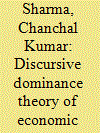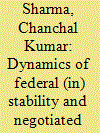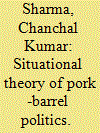| Srl | Item |
| 1 |
ID:
105191


|
|
|
| 2 |
ID:
190170


|
|
|
|
|
| Summary/Abstract |
Many studies have demonstrated a trend towards greater centralization of the federal system in India since 2014. However, the causal mechanisms that underpin this centralization remain underexplored. This article systematically explores the processes involved in tipping the delicate federal balance in favour of greater central control, and in doing so pays particular attention to the role of the party system therein. Our analytical narrative is structured around the assertion that ‘negotiated cooperation’ is contingent upon: (a) the interaction between constitutional structure and federal politics; (b) the capacity and willingness of subnational incumbents to safeguard their policy space and (c) the nature of party organization and the ideological disposition of the polity-wide parties towards territorial power-sharing. Drawing from India’s experience since 1952, we demonstrate that a dominant party system does not necessarily entail encroachment on subnational authority. At the most, it is a necessary but insufficient condition for federal imbalance. However, the problem of federal encroachment arises only when the dominant party is internally centralized and personalized, advocates unitarism and operates in a context of weak constitutional, political, procedural and judicial safeguards for self-and shared-rule. India under the leadership of Indira Gandhi, but more recently of Narendra Modi, comes close to meeting these conditions.
|
|
|
|
|
|
|
|
|
|
|
|
|
|
|
|
| 3 |
ID:
152456


|
|
|
|
|
| Summary/Abstract |
Despite the extensive literature on distributive politics, there is still is a lack of a theory of how political and fiscal institutions interact to shape the pork barreling ability of national leaders in a federal parliamentary democracy. This article examines how the party system types (dominant party versus coalition system) and particular attributes of discretionary grants (providing credit claiming opportunity or facilitating side payments) influence opportunities for pork-barrel politics. This article proposes a situational theory of distributive politics that states that incentives for exclusive targeting of affiliated states in one-party dominant systems drive national ruling parties toward particularism while the shrinking opportunity to indulge in such a policy in multiparty coalition systems creates a universalization effect. The disaggregated analysis of discretionary grants using Indian data for 14 states for the one-party dominant period (1972–89) and the coalition era (1996–2012) confirms the theoretical expectations. Additionally, the exercise brings to the fore the fact that the shift from particularism to universalism occurs for schematic grants that provide credit claiming opportunity. The ad hoc grants that are like side payments remain subject to particularism.
|
|
|
|
|
|
|
|
|
|
|
|
|
|
|
|